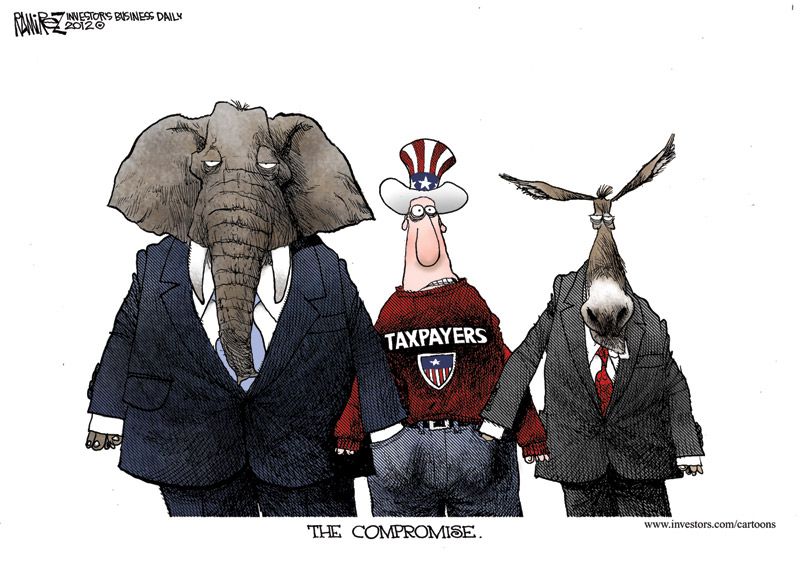“Punting the Pundits” is an Open Thread. It is a selection of editorials and opinions from around the news medium and the internet blogs. The intent is to provide a forum for your reactions and opinions, not just to the opinions presented, but to what ever you find important.
Thanks to ek hornbeck, click on the link and you can access all the past “Punting the Pundits”.
Follow us on Twitter @StarsHollowGzt
Bill Maher; New Rules for the New Year
2012: I call it the year in “meh.” Not the worst we’ve ever experienced, but nothing particularly great to say about it either. Like being a socialite, but in Tampa.
I am looking forward to 2013, however, because I love the odd-numbered years – they’re the ones without congressional elections, Olympics, World Cups or weird extra days tacked onto the calendar by so-called scientists. Odd-numbered years are chill. They’re the 3 p.m. of years – that small sliver of time when lunch is digested and it’s too early to think about dinner and you stand at least a fighting chance of getting something done.
In that spirit, here are the New Rules for the new year:
NEW RULE Now that their end-of-the-world prophecy has proved to be complete baloney, the Mayans must be given a job predicting election results for Fox News.
NEW RULE Sometime during the 2013 awards show season, “Gangnam Style” must be given an award for the shortest amount of time between my finding out what something is to my being completely sick of it. Besting the time of 7 hours, 12 minutes, set by “The Macarena” in 1996. [.]]
Robert Reich; Why Jobs Must Be Our Goal Now, Not Deficit Reduction
The news today from the Bureau of Labor Statistics is that the U.S. job market is treading water.
The number of new jobs created in December (155,000), and percent unemployment (7.8), were the same as the revised numbers for November.
Also, about the same number of people are looking for work (12.2 million), with additional millions too discouraged even to look.
Put simply, we’re a very long way from the job growth we need to get out of the gravitational pull of the Great Recession. That would be at least 300,000 new jobs per month.
All of which means job growth and wage growth should be the central focus of economic policy, not deficit reduction.
Treasury Secretary Tim Geithner, who has led the president’s negotiating team, is stepping down. President Obama has not yet named his replacement. [..]
Why not Paul Krugman?
He has a Nobel prize in Economics. He’s proven his ability to communicate economic knowledge to the multitude. And he’s a fierce opponent of cuts to Social Security and Medicare benefits, and the austerity dogma more generally, which as economic policy has a track record of spectacular failure around the world. As Treasury Secretary, Krugman would make job creation his top priority.
The Treasury Secretary doesn’t just oversee domestic U.S. economic policy. The Treasury Secretary also oversees international U.S. economic policy. The United States Executive Directors at the International Monetary Fund and the World Bank report to the Secretary of the Treasury. As Treasury Secretary, if Paul Krugman decides that the U.S. isn’t going to tolerate IMF support for cruel and destructive economic austerity policies in Europe and elsewhere, he’ll have the power to bring that about. Since the U.S. is far and away the most powerful country in the IMF and the World Bank, that would be a world-historical change.
Thomas Hedges: The Natural Gas Bubble
The natural gas industry is waging an aggressive public relations campaign to bolster investor confidence, despite evidence showing that shale gas is an unreliable resource and that the production process releases large amounts of methane into the atmosphere. Although hydraulic fracturing (or fracking) is in the media’s hot seat, the prospect of a drilling bubble coupled with the underreported problem of methane leakage may be the most destructive qualities of natural gas in the United States.
From commissioning false field reports to flooding television with commercials, natural gas companies are convincing Americans that gas will save the U.S. market; it will not.
Cherie Blair: A New Year’s Resolution to Benefit the World: Education for Women
n the holiday spirit of peace on Earth and good will toward men, I would argue that more good will toward women, notably in terms of education, would contribute to more peace on Earth.
The plight of women in many regions of the world remains dire. Two-thirds of the illiterate people on the planet are women. These women are illiterate not because they don’t care about learning, but because they are not considered fit for or worthy of an education. They are excluded from schools deliberately and systematically. [..]
Research shows that when you educate a girl, it brings greater and wider long-term benefits than when you educate a boy. An educated girl becomes a woman, and if she then becomes a mother, she passes what she has learned to her children, including the value of education itself. Her children are more likely to be educated, and more likely to be vaccinated. An educated woman is more likely to bring prosperity to her neighborhood so education is common sense, as well as good for economic development.
Amitabh Pal: Al Jazeera Purchase of Current TV an Attempt to Overcome Bias
It’s early in the new year, but the media landscape has already shifted with the news that Al Jazeera is purchasing Al Gore’s Current TV. [..]
For Al Jazeera, it is an attempt to overcome persistent prejudice against the network as anti-American and indeed even pro-terrorist. The attitude against the network is so negative in certain quarters that two years ago a public reception at a museum fundraiser in Maine featuring the Al Jazeera Washington bureau chief, Abderrahim Foukara, had to be moved to a private, undisclosed location.
Little wonder, then, that Al Jazeera English is available in only a few places in this country.

 The next “plateau” in the on going “Mythical Cliff” debate is the unconstitutional debt ceiling which the Republicans are now threatening to take hostage to demand draconian cuts to social security and other programs while sparing defense. With the settlement over the Obama tax cuts out of the way, the $1 trillion dollars in sequestration cuts are scheduled to take effect in two month at the same time authorized spending will “hit the roof,” setting up the showdown between the feral Tea Party dominated Republican held House, the roadblocked filibustered Senate and the ever capitulating White House. Still very much in danger are Social Security and Medicare which President Barack Obama has refused to take off the table and keeps offering up as sacrifice as part of an agreement. To get what they want the
The next “plateau” in the on going “Mythical Cliff” debate is the unconstitutional debt ceiling which the Republicans are now threatening to take hostage to demand draconian cuts to social security and other programs while sparing defense. With the settlement over the Obama tax cuts out of the way, the $1 trillion dollars in sequestration cuts are scheduled to take effect in two month at the same time authorized spending will “hit the roof,” setting up the showdown between the feral Tea Party dominated Republican held House, the roadblocked filibustered Senate and the ever capitulating White House. Still very much in danger are Social Security and Medicare which President Barack Obama has refused to take off the table and keeps offering up as sacrifice as part of an agreement. To get what they want the  Early this morning the
Early this morning the
Recent Comments